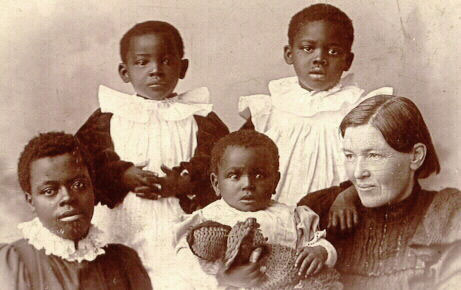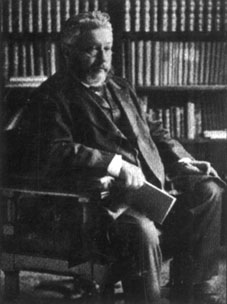Apr
10
2009

As a mill girl, she never felt quite at ease with the social niceties and ample lifestyle of the several missionary families comfortably stationed at Duke Town. (And no doubt they had reservations about her—a twenty-nine-year-old woman who admittedly had climbed every tree worth climbing between Duke Town and Old Town.)
“Sending a single woman to the Okoyongs was considered by many to be an exercise in insanity, but Mary was determined to go and would not be dissuaded. After visiting the area a number of times with other missionaries, Mary was convinced that pioneer work was best accomplished by women, who, she believed, were less threatening to unreached tribes than men. So in August of 1888, with the assistance of her friend, King Eyo, of Old Town, she was on her way north.
For the next quarter of a century and more, Mary would continue to pioneer missions in areas in which no white man had been able to survive.
For fifteen years (minus two furloughs) she stayed with the Okoyongs, teaching them and nursing them and arbitrating their disputes. Her reputation as a peacemaker spread to outlying districts, and soon she was acting as a judge for the whole region. In 1892 she became the first vice-consul to Okoyong, a government position she held for many years. In that capacity she acted as a judge and presided over court cases involving disputes over land, debts, family matters, and the like. Her methods were unconventional by British standards (often refusing to act solely on the evidence before her if she personally was aware of other factors), but they were well suited to African society.
Although Mary was highly respected as a judge and had influenced the gradual decline in witchcraft and superstition, she saw little progress in bringing Christianity to the Okoyongs. She considered herself a pioneer and she viewed her work as preparatory and was not unduly anxious that she could not send glowing reports back home of hosts of converts and thriving churches. She organised schools, taught practical skills, and established trade routes, all in preparation for missionaries (ordained men being her preference) to follow.”
Read the full article in PDF here.
Comments Off | tags: Biography, Church History, Mission | posted in Christian Life
Apr
8
2009

The Friday night before my nineteenth birthday Mrs. Finucane sends me for the sherry. When I return she is dead in the chair, her eyes wide open, and her purse on the floor wide open. I can’t look at her but I help myself to a roll of money. I take the key to the trunk upstairs. I take forty of the hundred pounds in the trunk and the ledger. I’ll add this to what I have in the post office and I have enough to go to America. On my way out I take the sherry bottle to save it from being wasted.
I sit by the River Shannon near the dry docks sipping Mrs. Finucane’s sherry. Aunt Aggie’s name is in the ledger. She owes nine pounds. It might have been the money she spent on my clothes a long time ago but now she’ll never have to pay it because I heave the ledger into the river. I’m sorry I wrote threatening letters to the poor people in the lanes of Lamerick, my own people, but the ledger is gone, no one will ever know what they owe and they won’t have to pay their balances.
From Angela’s Ashes by Frank McCourt
“As far as the east is from the west, so far hath he removed
our transgressions from us.” Psalm 103:12
Comments Off | tags: Biography, Justification | posted in Quotes
Apr
8
2009
Many people felt that New Buildings was scarcely the place for a man of Chapman’s type to live in. In fact a good part of the congregation at Grosvenor Street would have found it difficult to live there in those days, for drunkenness, filth and poverty were evident in the alleys around.
One day a wealthy gentleman approached him with a most attractive proposition. A fine house, standing in its own grounds in the country… But the offer was courteously declined. “No,” said Chapman, “I must live where the poorest saint can visit me.”
One day Mr. Chapman had the pleasure of an unexpected visit from a relative, who evidently desired to know how he lived…
Continue reading
Comments Off | tags: Biography, Devotion | posted in Ethics
Apr
8
2009
[Posted by Gordon Cheng at www.solapanel.org]
I’ve appreciated reading the sermons of 19th-century Baptist preacher Charles Spurgeon over the years, and have quoted him on my blog a number of times (not as much as the Pyromaniacs, but still a bit).
 So when I came down with the flu and found myself in bed for three days straight, I thought it would be encouraging to pick up Arnold Dallimore’s short, well-researched biography of the man himself. Sick Calvinists of the world, unite. Spurgeon, so it happens, was a lot sicker than me for most of his life. He was seriously and often crippingly and painfully ill, both mentally (with depression) and physically, from his mid-30s until his death from illnesses at age 57. The same went for his wife Susannah who, because of chronic illness, was more often than not unable to attend the meetings where he preached.
So when I came down with the flu and found myself in bed for three days straight, I thought it would be encouraging to pick up Arnold Dallimore’s short, well-researched biography of the man himself. Sick Calvinists of the world, unite. Spurgeon, so it happens, was a lot sicker than me for most of his life. He was seriously and often crippingly and painfully ill, both mentally (with depression) and physically, from his mid-30s until his death from illnesses at age 57. The same went for his wife Susannah who, because of chronic illness, was more often than not unable to attend the meetings where he preached.
If you haven’t ever read any Spurgeon, do yourself a favour and pick up a book of his sermons where you can, or click through on some of the links in the first paragraph of this post to get just a small taste for his straight-talking, gospel-centred style. Of his Calvinism, Dallimore quotes him (p. 67 of my 1991 Banner of Truth edition) saying
We only use the term ‘Calvinism’ for shortness. That doctrine we call ‘Calvinism’ did not spring from Calvin; we believe that it sprang from the great founder of all truth.
Spurgeon never received any formal theological training, although he’d begun reading Bunyan’s The Pilgrim’s Progress and Foxe’s Book of Martyrs from the age of six, and progressed on to later Puritan writers such as John Owen and Richard Sibbes by the time he was 10.
Here are some other facts and figures I picked up on the way: Continue reading
Comments Off | tags: Biography, Paul, Spurgeon | posted in Quotes




























